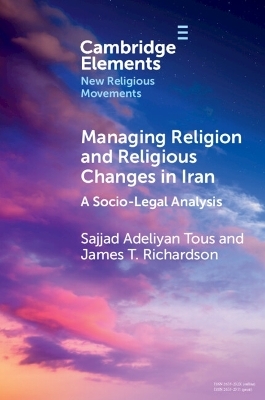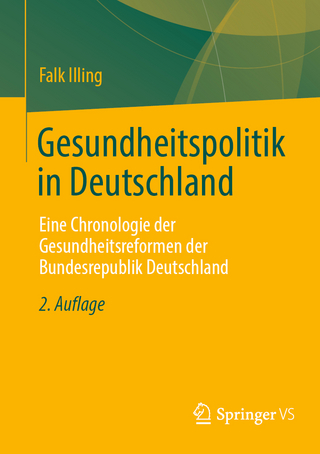
Managing Religion and Religious Changes in Iran
A Socio-Legal Analysis
Seiten
2024
Cambridge University Press (Verlag)
978-1-009-46007-1 (ISBN)
Cambridge University Press (Verlag)
978-1-009-46007-1 (ISBN)
This Element offers a theoretically informed examination of the manner in which religion, especially newer religious and spiritual movements, are managed by law and legal mechanisms in the authoritarian theocracy of Iran. It highlights how these phenomena have been affected by the intersection of law, politics, and Shiʿi theology.
This Element offers a theoretically informed examination of the manner in which religion, especially alternative and emergent religious and spiritual movements, is managed by law and legal mechanisms in the authoritarian theocracy of Iran. It highlights how these phenomena have been affected by the intersection of law, politics, and Shiʿi theology in recent Iranian history. The growing interest of Iranian citizens in new religious movements and spiritual currents, fostered by the cultural diffusion of Western writings and ideas, is described. The development of religious diversity in Iran and a corresponding loss of commitment toward some Islamic doctrines and practices are of considerable concern to both the Iranian religious and political establishments. This has led to social control efforts over any religious and spiritual movement differing from the regime's view of Islam. Those efforts, supported in large part by Western anticult ideas, culminated in the passage of a piece of stringent legislation in 2021. The Element closes with applications of theorizing from the sociology of law and of religion.
This Element offers a theoretically informed examination of the manner in which religion, especially alternative and emergent religious and spiritual movements, is managed by law and legal mechanisms in the authoritarian theocracy of Iran. It highlights how these phenomena have been affected by the intersection of law, politics, and Shiʿi theology in recent Iranian history. The growing interest of Iranian citizens in new religious movements and spiritual currents, fostered by the cultural diffusion of Western writings and ideas, is described. The development of religious diversity in Iran and a corresponding loss of commitment toward some Islamic doctrines and practices are of considerable concern to both the Iranian religious and political establishments. This has led to social control efforts over any religious and spiritual movement differing from the regime's view of Islam. Those efforts, supported in large part by Western anticult ideas, culminated in the passage of a piece of stringent legislation in 2021. The Element closes with applications of theorizing from the sociology of law and of religion.
Introduction and relevant background; 1. Religion and religious freedom in Iran's post-revolutionary constitution; 2. Religious freedom status of minority religious groups in Iran: an overview; 3. Religious life, cultural diffusion, and religious pluralism in Iran; 4. Social control of new religious movements in Iran: a chronology and analysis; 5. Conclusions, relevant sociological theories and theoretical applications; References.
| Erscheinungsdatum | 04.06.2024 |
|---|---|
| Reihe/Serie | Elements in New Religious Movements |
| Zusatzinfo | Worked examples or Exercises |
| Verlagsort | Cambridge |
| Sprache | englisch |
| Maße | 152 x 229 mm |
| Gewicht | 130 g |
| Themenwelt | Geisteswissenschaften ► Religion / Theologie |
| Sozialwissenschaften ► Politik / Verwaltung ► Politische Systeme | |
| ISBN-10 | 1-009-46007-2 / 1009460072 |
| ISBN-13 | 978-1-009-46007-1 / 9781009460071 |
| Zustand | Neuware |
| Informationen gemäß Produktsicherheitsverordnung (GPSR) | |
| Haben Sie eine Frage zum Produkt? |
Mehr entdecken
aus dem Bereich
aus dem Bereich
Eine Chronologie der Gesundheitsreformen der Bundesrepublik …
Buch | Softcover (2022)
Springer Fachmedien Wiesbaden GmbH (Verlag)
CHF 83,95


